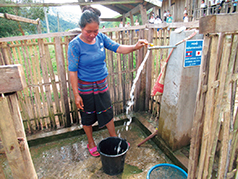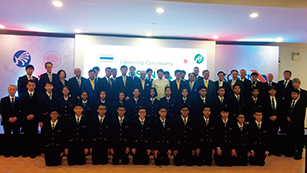ODA Topics 5
The Mekong-Japan Initiative for SDGs toward 2030

Well construction in Laos

Industrial Human Resources Development Project (Photo: JICA)
The five countries of Cambodia, Laos, Myanmar, Thailand, and Viet Nam are located along the Mekong River basin on the Indochinese Peninsula in Southeast Asia. Even among fast-growing Asian countries, these five countries have an especially high potential for economic growth and a large labor force, and their further development is greatly anticipated. The Mekong region is bordered by China to the north and the South China Sea to the east and south, and connected to India via the Indian Ocean to the west, making it a strategic point at the center of Asian transportation routes by both land and sea.
Japan has close economic and trade relations with the Mekong countries, therefore strengthening these relations with the region is very important diplomatically. In order to steadily advance Mekong–Japan cooperation, Japan has been holding the Mekong-Japan Summit Meeting every year since 2009, and so far, the meeting has been held in Tokyo every three years.
The title of this column, “The Mekong-Japan Initiative for SDGs toward 2030,” is a framework for cooperation between Japan and the Mekong countries that was adopted at the 11th Mekong-Japan Summit Meeting held in Bangkok, Thailand in November 2019. Its goal is to draw out the Mekong region’s potential in an optimal manner for the region to achieve the SDGs. The initiative supports the sustainable development of the Mekong region, and at the same time, symbolizes the “strategic partnership” between Japan and the Mekong countries.
While making use of quality infrastructure investment in accordance with international standards, the initiative will address the following three fields as areas of priority: (i) environmental and urban issues; (ii) sustainable natural resource management and utilization; and (iii) inclusive growth. Through efforts in each of the three areas, the initiative aims to contribute to: (a) reinforcing the resilience of the region and society; (b) maintaining and strengthening the region’s growth capability; and (c) ensuring that social development leads to improving the standard of life of everyone.
With regard to (i) environmental and urban issues, Japan has shared its “Osaka Blue Ocean Vision” with the Mekong countries, which was adopted at the G20 Summit in Osaka in 2019. Both Japan and the Mekong countries aim to reduce additional pollution by marine plastic litter to zero by 2050 (see also Environment and Climate Change Actions). For example, in Cambodia, Japan is working with the United Nations Development Programme (UNDP) to reduce plastic litter discharged into the ocean via the Mekong River, through the implementation of activities such as the promotion of the 4Rs (Refuse, Reduce, Reuse, and Recycle) and raising awareness of waste separation among individuals and the private sector.
Regarding (ii) sustainable natural resource management and utilization, climate change and other factors have led to changes in the water levels of the Mekong River, requiring more complex flood and drought countermeasures than ever before. Against this backdrop, Japan is strengthening its coordination with the Mekong River Commission (MRC)*, recognizing the importance of managing the water resources of the Mekong River under an open framework. In March 2020, Japan and the MRC signed an Exchange of Notes for grant aid with flood and drought management of the Mekong River basin in mind. This was to improve the capabilities of MRC personnel and enhance its facilities and functions so as to increase the accuracy of rainfall and water level observations at the Mekong River basin.
As regards to (iii) inclusive growth, Japan is engaged in education and human resources development efforts for the realization of inclusive growth under the “G20 Initiative on Human Capital Investment for Sustainable Development” and the “Industrial Human Resource Development Cooperation Initiative 2.0” (see also Quality Education for Al, and Assistance for East Asia). Under these initiatives, in Thailand, Japan established its unique educational system KOSEN (College of Technology) to develop industrial human resources in the Mekong region, and is providing cooperation to realize the same level of KOSEN education as that in Japan (see “Support for Southeast Asia” and “(4) Partnership with Universities and Educational Institutions” for details).
In addition, from the perspective of promoting further cooperation in these three areas, Foreign Minister Motegi announced the “KUSANONE Mekong SDGs initiative” at the Mekong–Japan Foreign Ministers’ Meeting in July 2020, noting that Japan would support the realization of the SDGs and social and economic development of the five Mekong countries that catered to local needs. Japan provided Grant Assistance for Grass-Roots Human Security Projects amounting to at least ¥1 billion to the Mekong region countries in FY2020, and it intends to continue this effort.
Furthermore, the Green Mekong Forum, which has been jointly held by the public and private sectors six times since 2011, was upgraded to the Mekong-Japan SDGs Forum, and will follow up on the medium to long-term implementation of “The Mekong-Japan Initiative for SDGs toward 2030.”
Japan will work hard to build a partnership that will mutually elevate each party, supporting the Mekong countries’ own initiatives while being mindful of the people in the Mekong countries and their societies.
*The MRC was established in 1995 under the Agreement on the Cooperation for the Sustainable Development of the Mekong River Basin concluded by the four lower Mekong countries (Cambodia, Thailand, Viet Nam, and Laos). In addition to flood and drought control, the MRC conducts river management of the Mekong River in a wide range of fields, including fisheries resource management, dam development, and environmental issues.
